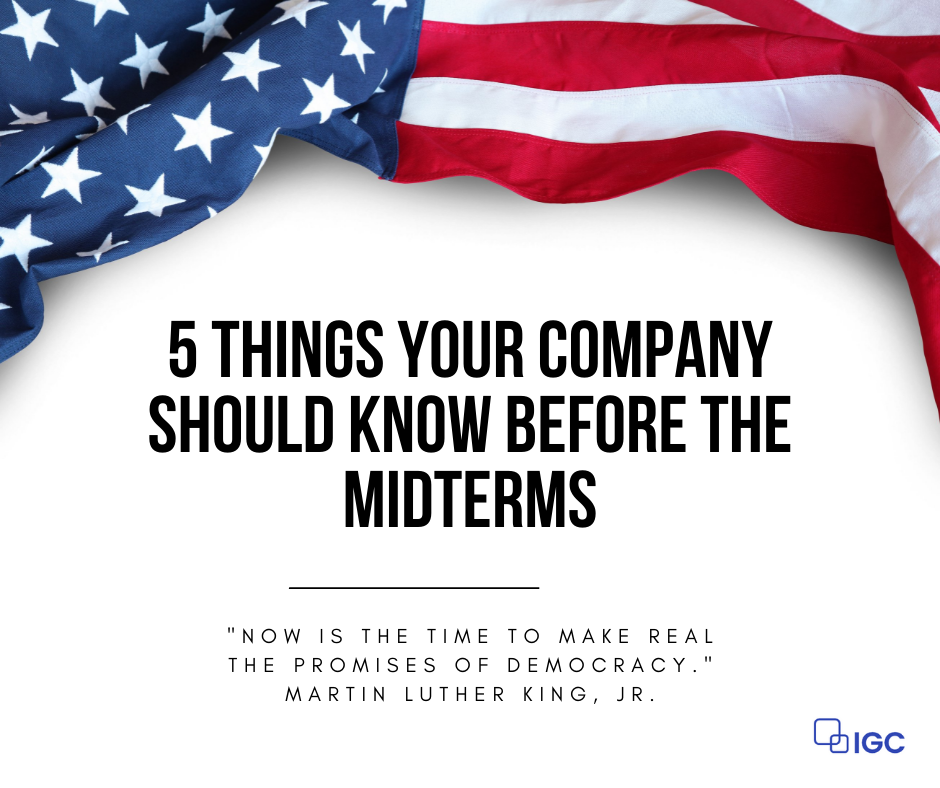Five Things Your Company Should Know Before the Midterms
Today marks MLK Day – a time to commemorate the historic life of Martin Luther King, Jr. and his advocacy to build a more just and equitable future for all. Over the weekend, members of MLK’s family went to Arizona to march in defense of voting rights. The significance of the current political climate and efforts to change voting laws was not lost on the Kings. Arndrea Waters King said, “On the historic day of service to commemorate my father-in-law and continue his work, we will join our voices together to call for no celebration without meaningful voting rights legislation. Voting is an essential part of our democracy’s infrastructure, and we cannot afford for it to crumble any further.”
While voting itself is an individual act, businesses play an important role in encouraging participation. With the upcoming 2022 midterms, companies have a momentous opportunity to engage their stakeholders and increase voter turnout in our country. Here are five reasons to act:
Americans trust CEOs more than their own government.
In the most recent Edelman Trust Barometer survey, 61% of people expressed trust in business, eight points higher than those who expressed trust in government. Business was also the only institution viewed as both competent and ethical. Because of this high level of trust, companies are able to use their voice to affect change in many different aspects of society, including civic engagement.
Midterm voter turnout is historically low.
While voter turnout is typically low in non-presidential elections, the 2018 midterms had the highest voter turnout for a midterm election in over a century. Still, during that election only 49.4% of eligible voters voted. With the difference in some races coming down to just a few hundred votes, it is easy to see the importance of every vote.
Election Day is just around the corner.
You may be thinking, “Isn’t Election Day the first Tuesday in November? Why do I need to worry about any of this now?” If you can’t already tell from the growing number of campaign ads on TV, elections are quickly approaching. In Texas, the first day to vote early in the primaries is February 14th. And even more importantly, the voter registration deadline is January 31st. If you wait until a few days before Election Day to think about voting and you haven’t registered, you’re out of luck.
In many states, it is now more difficult for some people to vote.
Last year, 19 states enacted more than 30 restrictive voting laws. One of the most suppressive bills came from Georgia that includes a ban on distributing water to people waiting in line to vote. In Texas, the legislature passed Senate Bill 1 which has a variety of measures, from banning drive thru and 24-hour voting to more stringent requirements for mail-in ballots and voter outreach. Multiple lawsuits have been filed against SB1 by organizations claiming the law is unconstitutional, including by the US Department of Justice.
Encouraging people to vote is nonpartisan, and it’s easy!
While some companies hesitate to get involved in political advocacy because they don’t want to upset stakeholders who may be on the other side of an issue, the act of voting and encouraging others to vote is completely nonpartisan. Businesses don’t need to tell employees, customers, etc. to vote for a specific candidate/party - they just need to tell people to vote. There is a wide variety of (easy) ways to do this. Some companies add voter registration applications to new hire packets or post voting reminders on their intranet. Many organizations already have a policy in place giving employees paid time off to vote; some take it a step further and make Election Day a corporate holiday. The key to a successful voter engagement program is communication – making sure stakeholders know when voting deadlines are, where to find out what’s on the ballot, etc. IGC offers a voting toolkit with out-of-the-box communication templates and resources companies can use to make sure their stakeholders are ready to head to the polls.
Bottom Line: Voter mobilization is good for business.
According to a recent study from the Harvard Kennedy School’s Ash Center, companies that have voter engagement programs not only help mobilize voters, but also create additional business value by improving employee relations, elevating reputation with elected officials, and/or increasing brand awareness. In fact, 82% of respondents in a 2021 Global Strategy Group poll said they are [more] likely to purchase from companies that have encouraged people “to participate in our democracy by providing information about issues in their community and resources to help them register and vote.”
As MLK Jr. once said, “Now is the time to make real the promises of democracy.” If companies truly care about equity and stakeholder engagement, they will do their part to encourage civic participation. Not only is it good for business, but it’s good for our democracy.
For more information on how to get your company involved in voter mobilization, connect with us at IGC.
